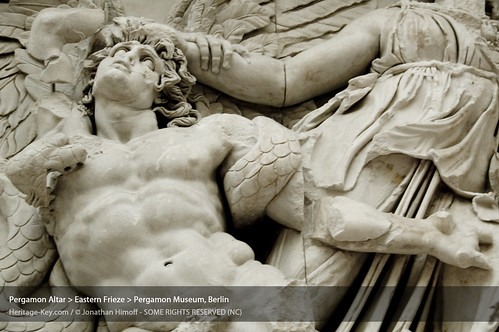 While Turkey has managed to reclaim some major historical artifacts smuggled from Turkey to the US and the UK, it is still unable to implement effective measures against the smuggling of new ones. According to the “Cultural and Natural Assets Smuggling Report” prepared by the Culture and Tourism Ministry based on figures provided by the KOM – the Anti-smuggling and Organized Crime Bureau of the police department – Turkey sees higher statistics related to the smuggling of historical artefacts every year; in 2008, when authorities seized 42,073 historical artefacts and detained 4,077 suspects in 1,576 operations. In 2003 security authorities seized 3,255 historical artefacts that smugglers were attempting to take abroad. With a steady rise over years, this figure rose to 17,936 in 2007. As only the amount of seized items can be measured, there is no reliable, if any, information about the number of historical and cultural artefacts illegally taken outside the country.
While Turkey has managed to reclaim some major historical artifacts smuggled from Turkey to the US and the UK, it is still unable to implement effective measures against the smuggling of new ones. According to the “Cultural and Natural Assets Smuggling Report” prepared by the Culture and Tourism Ministry based on figures provided by the KOM – the Anti-smuggling and Organized Crime Bureau of the police department – Turkey sees higher statistics related to the smuggling of historical artefacts every year; in 2008, when authorities seized 42,073 historical artefacts and detained 4,077 suspects in 1,576 operations. In 2003 security authorities seized 3,255 historical artefacts that smugglers were attempting to take abroad. With a steady rise over years, this figure rose to 17,936 in 2007. As only the amount of seized items can be measured, there is no reliable, if any, information about the number of historical and cultural artefacts illegally taken outside the country.
Of course the smuggling of historical artefacts happens most often in conflict zones – like Iraq and Afghanistan – where the ongoing wars allow smugglers to operate freely. But Turkey is surely not a conflict zone? That is true, but still the majority of historical artefacts smuggled out of these conflict zones are shipped to Western countries via Turkey, to eventually end up in collections in the US, the UK, Switzerland and Japan. Antique coins make this trip most often; small and thus relatively easy to take abroad without detection – you can even smuggle one out in your wallet – they are the smuggler’s ‘favourite’ objects.
To counteract the increasing cases of smuggling of historical artefacts, security authorities asked for measures to be taken. There should be better security in museums to prevent theft, a sufficient and clear inventory of historical artifacts in the country should be composed and a bill to limit and inspect the use and sale of metal detectors should be passed. The Culture Ministry is likely to convey this proposal to the government in the coming days.
Probably the most significant item that was taken outside of Turkey is the Bergama Zeus-Athena Altar; however, this altar cannot be reclaimed as it was sold by an order from the Ottoman sultan of the time (sounds familiar?) at a very low price to Germany. The South Agora Portal of Miletos, too, had been taken out of the country in the same manner.
But for other artefacts, there’s still hope for return; there does exist a minor list of ‘artefacts abroad’ and the Ministry of Culture and Tourism has already spent $17 million on reclaiming these artifacts and continius its efforts to repatriate more. According to todayszaman.com these artefacts were illegally taken out of Turkey and were – or were not yet – returned:
- Germany – The Aphrodisias Old Fisherman Statue, the mihrab (niche) of Konya’s Beyhekim Mosque, the Hac Bayram Veli tomb and Troy artifacts. (Returned: Boazky tablets and Sphinxes, an Antiochos head fragment, artifacts from the Henkel collection, a terracotta statue, a marble bas-relief tablet and artifacts seized in Bremen and Tutlingen were returned to Turkey.)
- United Kingdom – (Returned: The Ottoman tombac, the pulpit door stolen from zmir’s Birgi Aydnolu Mehmet Bey Mosque, artifacts from a sunken ship in the English Channel, artifacts seized at Heathrow Airport and a bronze Dionysus statue were returned to Turkey.)
- Russia – Troy artifacts.
- Austria – The artifacts seized at the Suben border crossing and triple Hekate statue still have not been returned. (Returned: The marble head of a woman was able to be reclaimed.)
- The US – The Heracles statue, the Kumluca artifacts. (Returned: A 93-piece collection of Ottoman apparel, a seaman’s lantern, the Meleager head from the historical site of Aphrodisias, a lead seal, Atatrk’s silver cigarette case, a Quran stolen from the Nuruosmaniye Library and 1,676 Elmali coins were returned to Turkey.)
- Denmark – (Returned: The Sphinx figure from the Diyarbakr Museum, the sarcophagus (sanduka) from the Akehir Seydi Mahmut Hayrani tomb, the Cizre Ulu Mosque doorknob, several Quran pages from the Nuruosmaniye Library and the screens of the portal of Konya’s Beyehir Erefolu Mosque were returned to Turkey.)
- Italy – The process of the reclamation of an ancient inscription tablet seized by the Italian Interpol is under way. (Returned: a bronze vase was returned.)
- Switzerland – (Returned: The Elmal coins, the statue of a woman stolen from the courtyard of the zmir Museum Directorate and some artefacts from the Roman era seized in Zrich were returned to Turkey.)
- France – Many Lydian artefacts are still in this country.